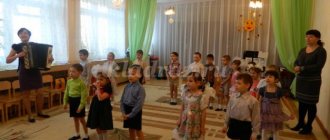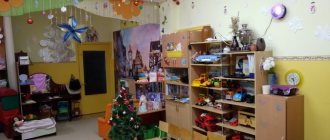Requirements for the daily routine in preschool educational institutions according to SanPiN
The standard daily routine in kindergarten is designed for 12 hours, which the child spends within the preschool walls. Any adjustments are made taking into account climatic conditions, geographical location, and other factors. The regime is drawn up in accordance with sanitary and epidemiological rules and regulations SanPiN 2.4.12660–10. Key points:
- The kindergarten provides four meals a day with a time interval of 4 hours between meals.
- There are 2 walks in the fresh air - in the morning and after a nap. In total, walking with children requires 3–4 hours. The time spent outside is reduced at temperatures below –15 °C and wind speeds of 7 m/s.
- According to the daily schedule, nap time is 2–2.5 hours, while the teacher must be present in the bedroom and monitor the sleeping children.
- It is required to ventilate the room for less than 10 minutes. every 90 minutes If there are no children, arrange ventilation 30 minutes in advance. before they arrive from the street or classes. The air temperature should not drop more than 2–4 °C; it is important to avoid drafts.
- Bed linen in kindergarten must be changed at least once a week (according to the schedule).
- In the cold season, the teacher should meet the children in the morning in the group, in warm weather - outside (at the group site).
Diet
| Time | Eating | Approximate menu |
| 8:30 | Breakfast | A hot dish (milk porridge, cottage cheese casserole, egg omelet), tea or cocoa, a sandwich with butter and cheese. |
| 10:00 | Lunch | Drink with or without fruit. |
| 12:00 | Dinner | First course (borscht, soup), second (side dish with meat or fish), salad or vegetables, cold drink. |
| 15:00 | Afternoon snack | Baking (bread), drink. |
| 18:00 | Dinner | Meat or fish dish, cottage cheese, drink. |
Kindergarten classes
In kindergarten, they develop speech skills, broaden their horizons, introduce them to the basics of mathematics and writing, instill a love of creativity and culture, and provide new knowledge. In the absence of medical contraindications, classes are conducted in the following areas:
- physical training;
- music, singing;
- art;
- mathematics;
- development of speech, logic, fine motor skills;
- preparation for school.
In kindergarten, independent games are held, when children communicate with peers, make friends, and relax. There are no more than 3 classes per day in kindergarten, with a break between them of at least 10 minutes. Lesson duration:
- junior group (children 3–4 years old) – 10 min.;
- middle group (4–5 years) – 15 minutes;
- senior group (5–6 years old) – 20 min.;
- preparatory group (6–7 years old) – 30 min.
Daily routine in kindergarten
The daily routine in kindergarten depends on the age of the child, the specialization of the preschool educational institution, and other factors at the discretion of the teacher (methodologist, management). Activities that require increased mental stress for children are carried out in the first half of the day, alternating with physical education, music, and fine arts. This is important in order not to overload the child, to make him a comprehensively developed personality to the delight of dad and mom.
Nursery group (2–3 years)
It is important to follow the daily routine in kindergarten from the nursery on. This is necessary so that the kids adapt faster. It is important to speed up the process of getting used to the teachers and nanny so that the child does not worry and goes to kindergarten with joy every morning. Approximate daily schedule:
| Time | Daily regime |
| 7:00–8:00 | Reception of babies |
| 8:00–8:20 | Breakfast |
| 8:20–9:00 | Independent games in a group |
| 9:00–9:30 | Preparing for the walk |
| 9:30–11:30 | Street games |
| 11:30–11:45 | Return to the group, preparation for lunch |
| 11:45–12:15 | Dinner |
| 12:15–12:30 | Preparation for sleep |
| 12:30–15:00 | Quiet hour |
| 15:00–15:15 | Waking up after a nap |
| 15:15–15:30 | Afternoon snack |
| 15:30–15:45 | Stand alone games |
| 15:45–16:15 | Group classes |
| 16:15–16:30 | Preparing to go outside |
| 16:30–18:00 | Walk |
Junior group (3–4 years old)
| Time | Daily regime |
| 7:00–8:20 | Reception of children, morning exercises, games |
| 8:20–8:50 | Preparing for breakfast, eating |
| 8:50–9:20 | Games, preparation for classes |
| 9:20–10:00 | Classes |
| 10:00–10:20 | Preparing for the walk |
| 10:20–12:20 | Outdoor recreation |
| 12:20–13:00 | Dinner |
| 13:00–15:15 | Quiet hour |
| 15:15–15:45 | Awakening, games, air procedures |
| 15:45–16:00 | Afternoon snack |
| 16:00–16:30 | Games, physical activity |
| 16:30–16:50 | Gathering outside |
| 17:00–18:00 | Walk |
Middle group (4–5 years old)
| Time | Daily regime |
| 7:00–8:20 | Reception of pupils, gymnastics, outdoor games |
| 8:20–8:50 | Preparing for breakfast, eating |
| 8:50–9:50 | Preparation for classes, classes |
| 9:50–11:50 | Gathering outside for a walk |
| 11:50–12:15 | Return to the group, preparation for lunch |
| 12:15–12:50 | Dinner |
| 12:50–13:00 | Preparing for sleep |
| 13:00–15:00 | Quiet hour |
| 15:00–15:25 | Awakening, games, air procedures |
| 15:25–15:50 | Afternoon snack |
| 15:50–16:30 | Games, physical activity, music lessons, educational program |
| 16:30–18:00 | Gathering outside for a walk |
Senior (5–6 years old)
| Time | Daily regime |
| 7:00–8:30 | Reception of pupils, duty, gymnastics, outdoor games |
| 8:30–8:55 | Preparing for breakfast, eating |
| 8:55–10:50 | Developmental activities |
| 10:50–12:25 | Preparing for a walk, walk |
| 12:25–12:40 | Returning from the street, preparing for lunch |
| 12:40–13:15 | Dinner |
| 13:15–15:00 | Getting ready for bed, quiet time |
| 15:00–15:25 | Waking up, personal hygiene procedures |
| 15:25–15:40 | Afternoon snack |
| 15:40–16:20 | Games, physical education, labor, fine arts |
| 16:30–18:00 | Outdoor recreation |
Preparatory group (6–7 years old)
| Time | Daily regime |
| 7:00–8:30 | Reception of pupils, duty, gymnastics, outdoor games |
| 8:30–8:50 | Preparing for breakfast, eating |
| 8:50–9:00 | Getting ready for classes |
| 9:00–11:05 | Preparing a preschooler for school |
| 11:05–12:35 | Gathering for a walk, walk |
| 12:35–12:45 | Return to the group |
| 12:45–13:15 | Dinner |
| 13:15–15:00 | Quiet hour |
| 15:00–15:25 | Waking up, maintaining personal hygiene |
| 15:25–15:40 | Afternoon snack |
| 15:40–16:30 | Games, work, fine arts, communication with peers, gathering outside |
| 16:30–18:00 | Outdoor recreation |
ABC of the regime
There are rules in all areas of our lives, and they also exist in observing the regime. As we said above, there is a diet for preschoolers, physical activity, sleep, games, and activities.
Diet. If we are talking about proper nutrition, then the regime is most accurately followed in preschool institutions, so it is worth focusing specifically on the organization of nutrition in kindergarten:
- at least 4 times a day;
- a hot meal at least 3 times a day;
- according to daily caloric needs: breakfast 25%, lunch 40%, afternoon snack 15%, dinner 20%;
- according to the daily calorie intake: 5 years – 2000 kcal, 6 years – 2200 kcal, 7 years – 2400 kcal;
- by quantity - you should not give a portion larger than the child usually eats (it is better to add a supplement).
The menu should include meat and dairy products, bread, vegetables and fruits every day.
In terms of time, the mode is built like this:
- breakfast at 8-9 o'clock,
- lunch at 12-13 o'clock,
- afternoon tea at 15-16 hours,
- dinner at 18:30-19:30 hours.
Meal times should be the same on weekdays and weekends.
It is advisable that the last meal be an hour and a half before bedtime.
Mode of physical activity and rest. Every day a child makes many movements, so physical activity means not only physical education, but also active games, sports, movement and relaxation. And here, too, there is a regime that ensures proper physical development.
- The peak of physical activity should occur in the first half of the day.
- Weekly physical activity for children 5-7 years old is 6-8 hours per week, according to SanPiN.
- Morning exercises are required.
- Physical education classes in a preschool institution - 3 times a week: children 5 years old - 25 minutes, children 6-7 years old - 30 minutes.
- Outdoor active games while walking (in bad weather they are replaced by a full set of exercises indoors).
- Physical education minutes between mental activities.
- Exercising after a nap.
- Moderately active games on the second walk.
Moderate physical activity should be observed immediately before breakfast, before mental activities and in the evening before bed.
Sleeping mode. A proper sleep schedule helps restore your baby's mental and physical strength that was spent on the active part of his day. Not only his psycho-emotional state, but also his physical health depends on how a child’s sleep is organized. Healthy sleep means strong immunity. And now, in order.
- Duration of sleep for preschoolers: 5-6 years – 12 hours, 7 years – 10-11 hours. But much is individual - depending on temperament and workload, the required time for sleep may increase.
- Morning awakening should occur at 7:00-8:00, it depends on biorhythms and family habits, but you should not wake up later.
- Daytime sleep in children 5-6 years old lasts 1-1.5 hours. At 7 years old, a baby may refuse to sleep, but active children need about 1 hour of sleep.
- Evening bedtime depends on the presence of additional physical or emotional stress. It is recommended that children aged 5-6 years go to bed at 20:30 - 21:00. At 7 years old it is possible to shift the time of falling asleep by half an hour.
Mode of exercise (mental activity). Both kindergarteners and children who do not attend kindergarten are not deprived of developmental activities in preschool age. But like any other activity, the time and number of classes must be correctly distributed and systematized. In other words, the home regime should not differ much from the regime in preschool institutions. The organization of classes in the general daily routine is as follows:
In the morning after breakfast - two or three multidirectional classes. Duration of classes according to age: 4-5 years – 20-25 minutes per type; 6-7 years – 30-35 minutes.
If the walk is cancelled, you can add another creative activity or educational game.











